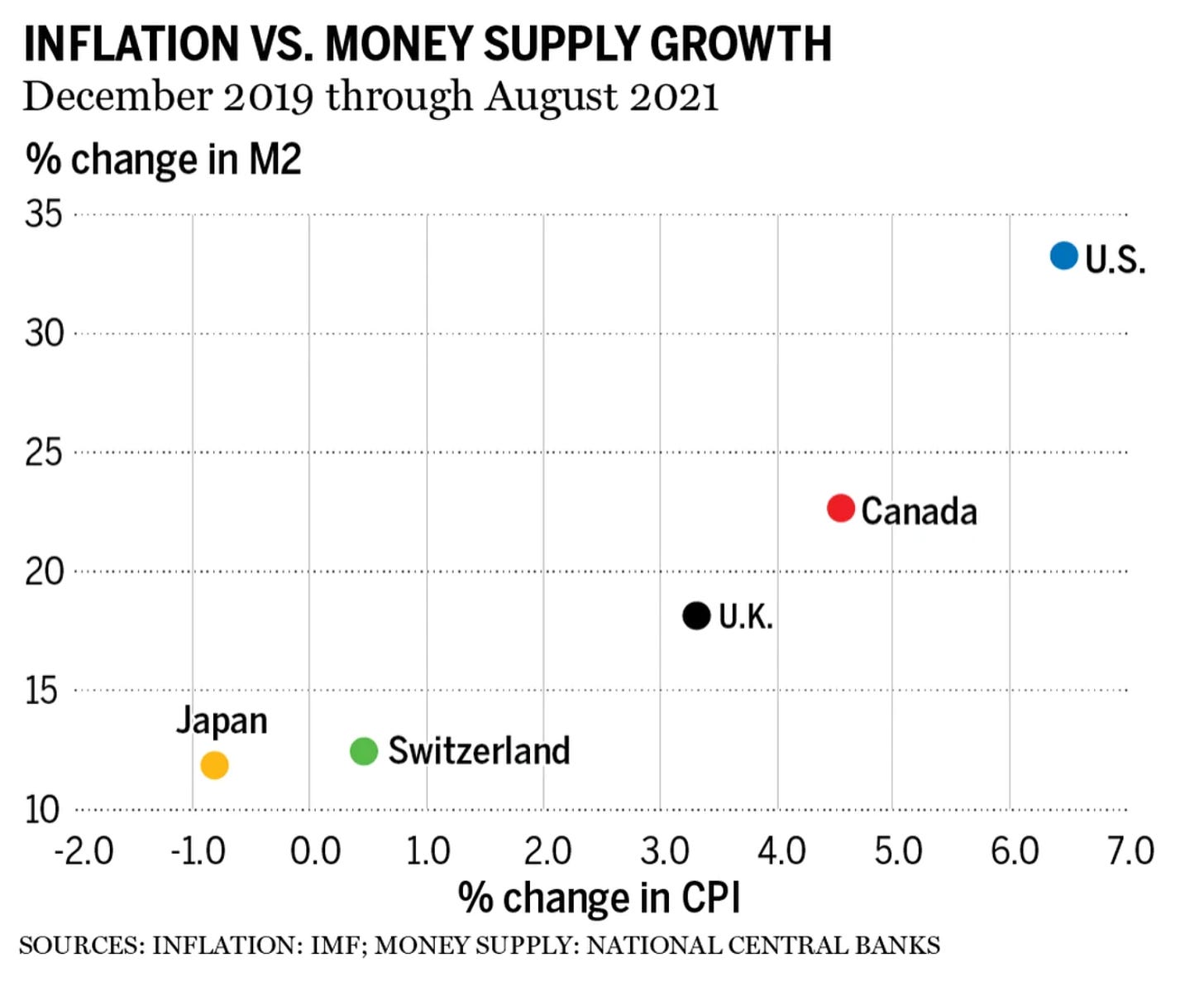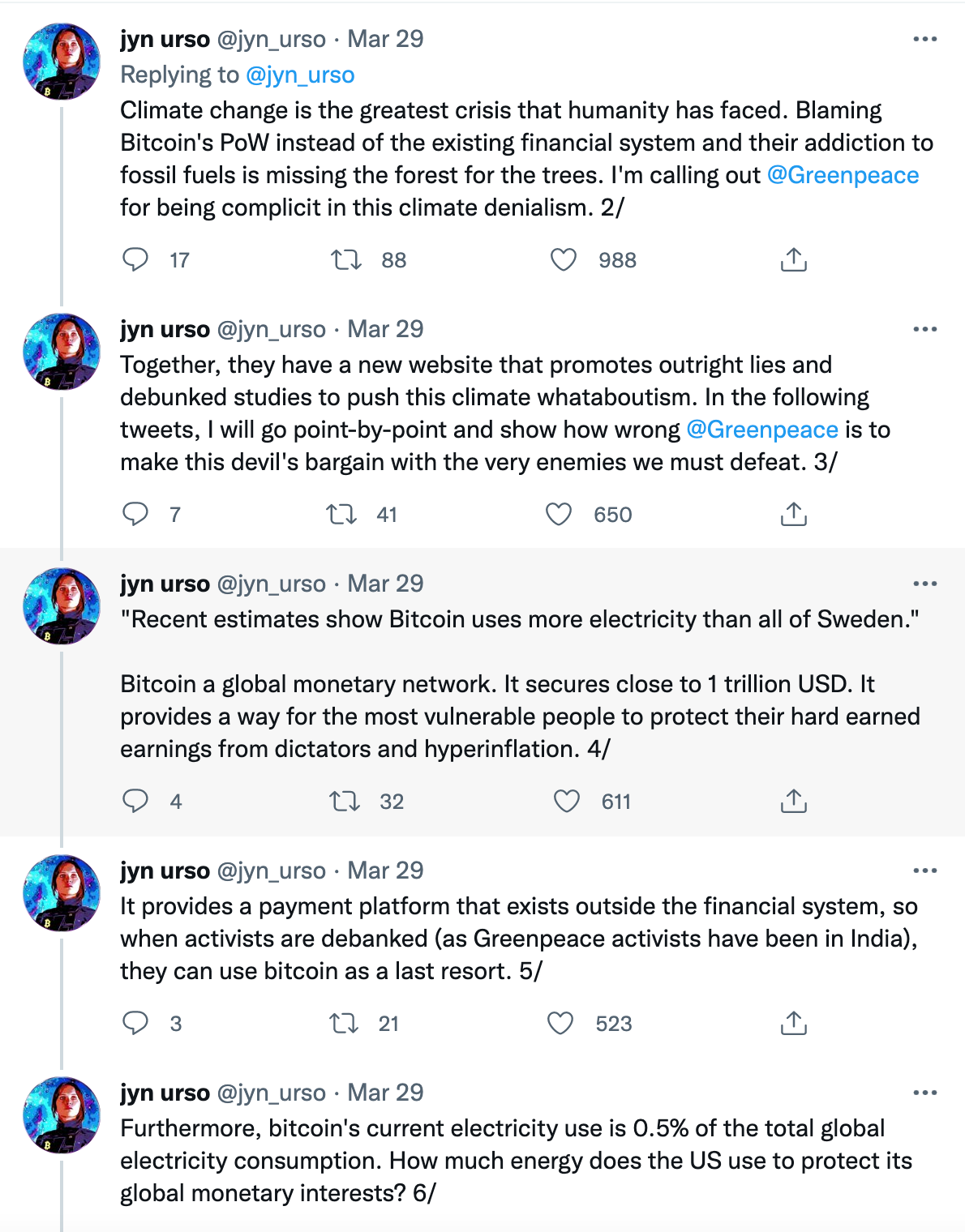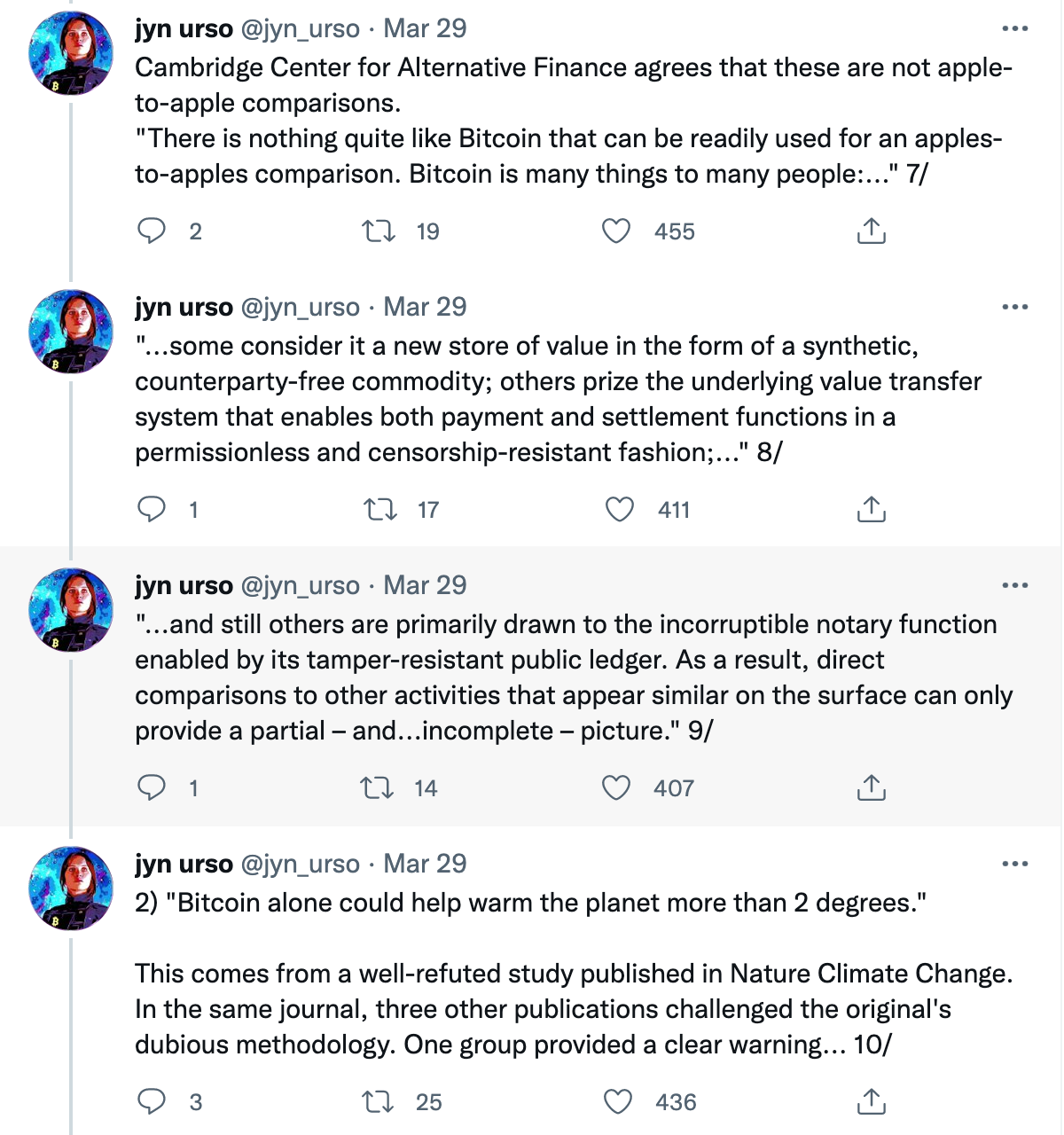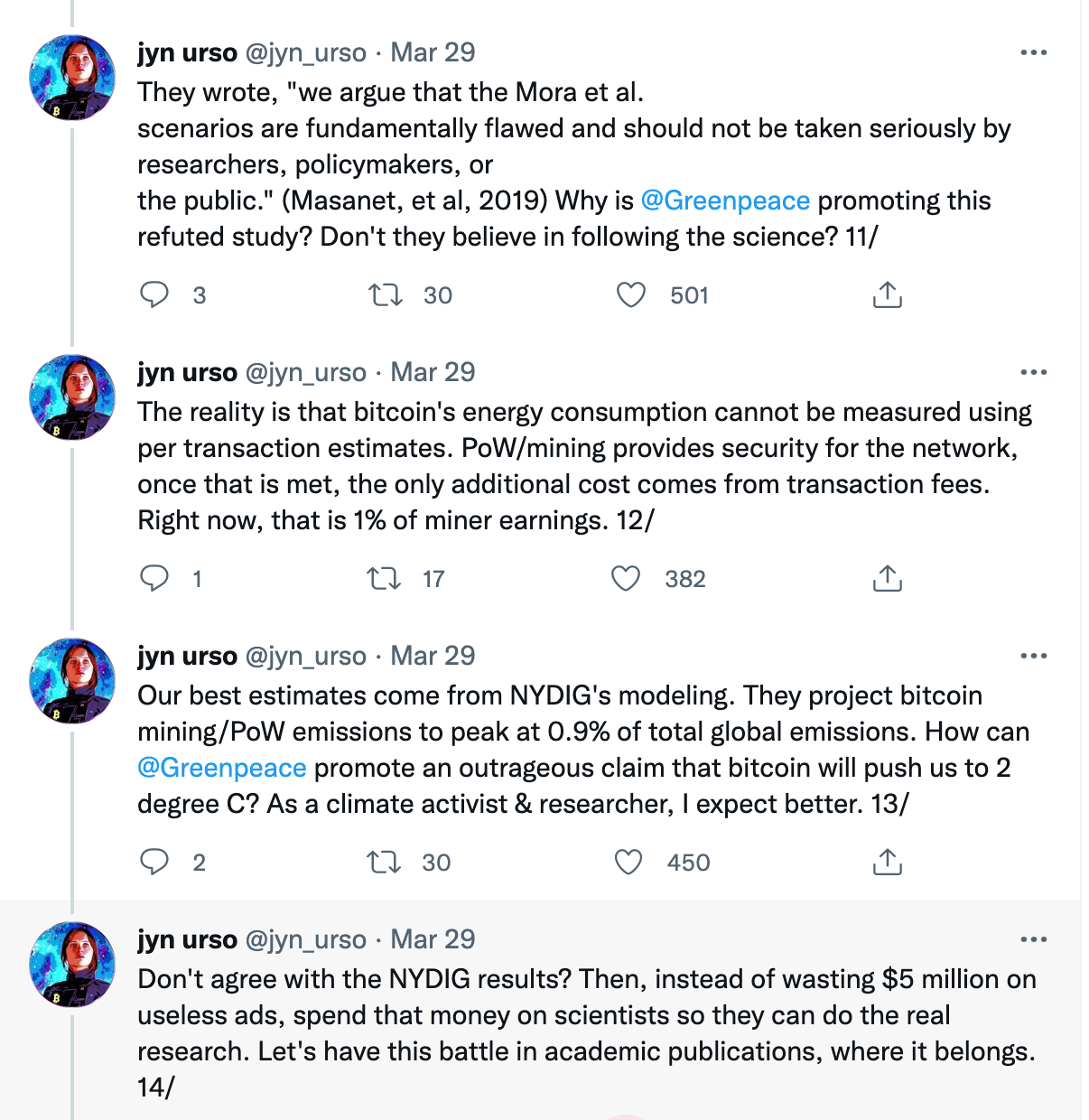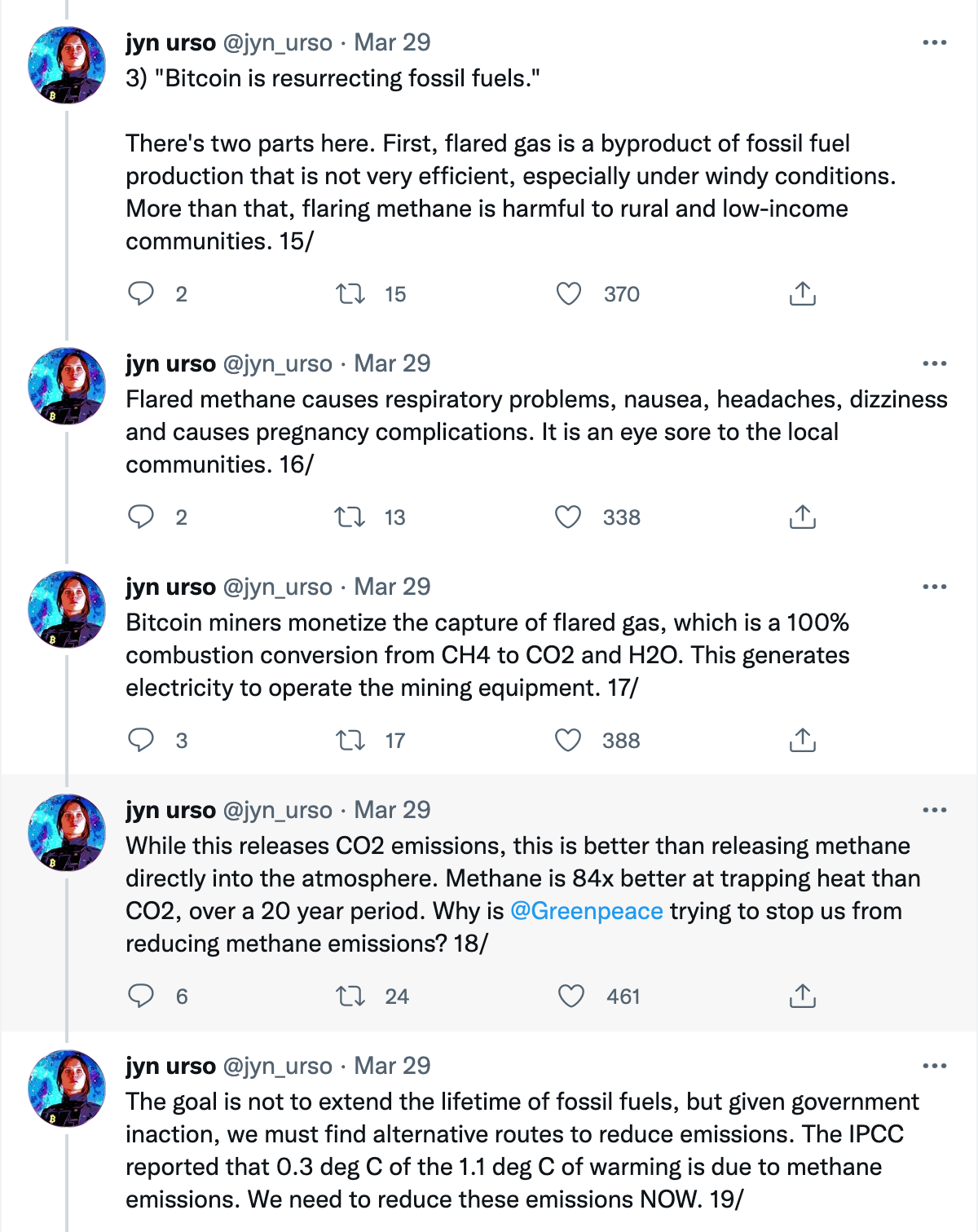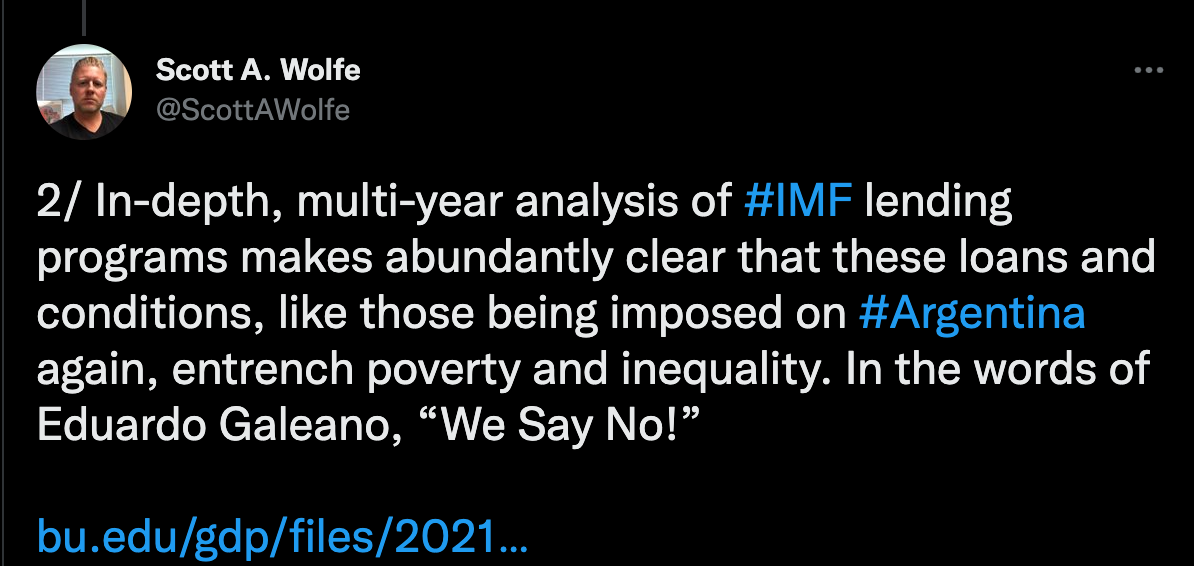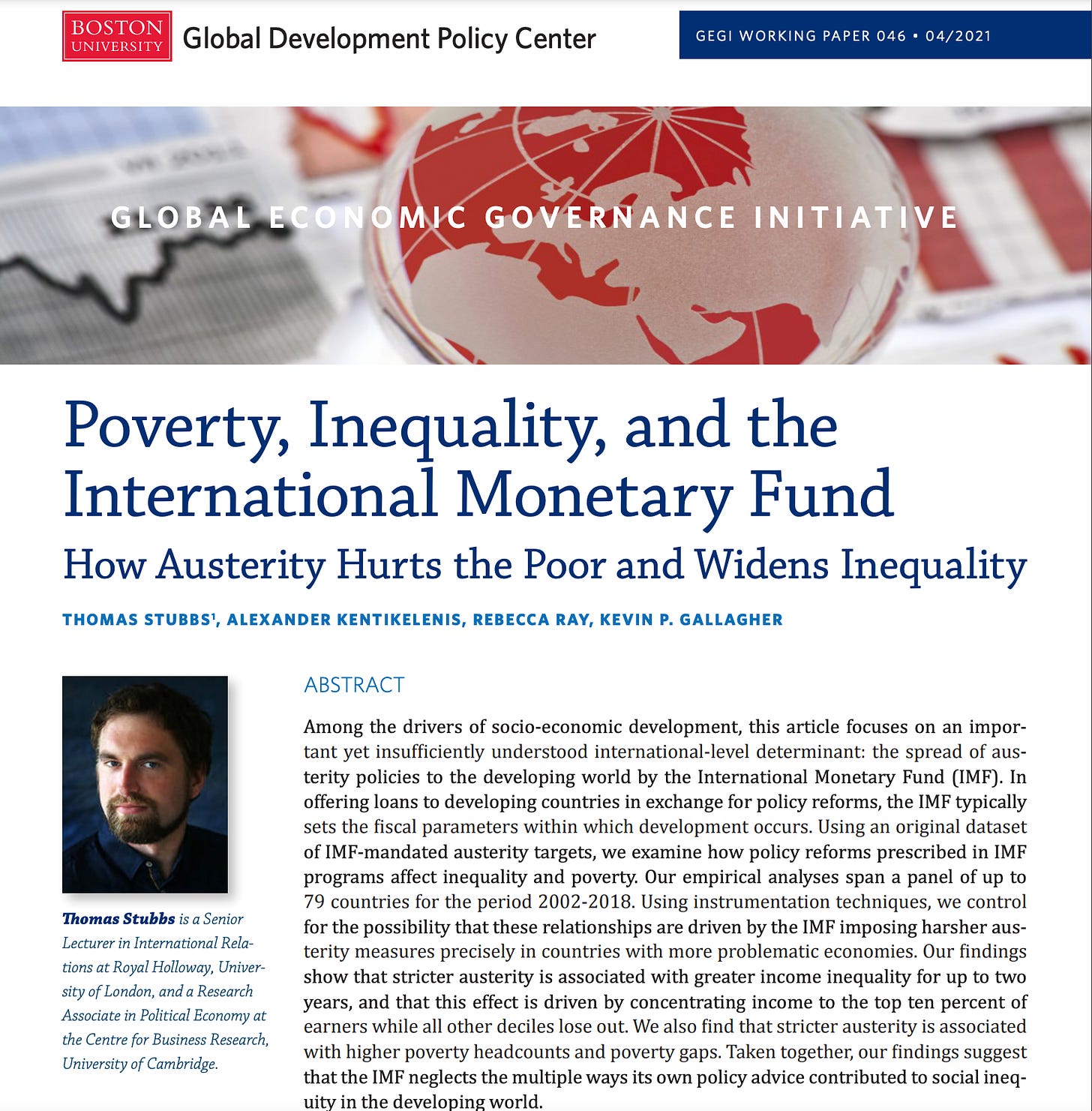Think Bitcoin™ Issue #32
My journey from Bernie to Bitcoin part 2; investigating popular Bitcoin criticisms; folding Bitcoin into everyday life; international orgs come after Bitcoin
Hey friends, welcome back to Think Bitcoin™ for issue #32, and Happy Mother’s Day to all the mothers out there! Special welcome to the new subscribers. I’m glad you’re here. As always, if you have any questions or comments, feel free to reach out. You can also find me on Twitter (@TheWhyOfFI).
In this issue:
Long Reads: “In Search of the Revolution: My Journey From Bernie to Bitcoin” Part 2
Content Round-Up: 2 articles, 1 podcast, 1 YouTube channel
Headlines: International orgs come after Bitcoin
Miscellaneous: Reception of Bitcoin vs. reception of Einstein’s theory of general relativity
As always, if you find this newsletter interesting or useful, please share it with others who might find it interesting or useful, too!
Long Reads
In Search of the Revolution: My Journey From Bernie to Bitcoin
Part 2: The Big “This” that Bitcoin Fixes
“Politics is the art of looking for trouble, finding it everywhere, diagnosing it incorrectly and applying the wrong remedies.” -Groucho Marx
In the last issue, I wrote about the first major breakthrough for me on my intellectual journey from a fervent Bernie Sanders supporter to a committed Bitcoiner, which involved confronting the idea of trust in politics and wondering how Bitcoin’s trustlessness could be leveraged toward a positive political end via its potential to constrain lawmakers.
This week I want to talk about the second major breakthrough I experienced on this journey.
I want to start by suggesting something that is going to sound, at first blush, plainly antithetical to some (perhaps many) in the Bitcoin community, but which I think might resonate with those who have emigrated to or arrived at a belief in Bitcoin from a more left-leaning political starting place (like, say, the Bernie Sanders ecosystem).
Progressives and Bitcoiners both identify and acknowledge a similar slate of problems with the status quo. Progressives would highlight and foreground wealth inequality, unequal financial access, monopolies, an overpowerful cadre of tech companies, excess corporate power, exploitative big banks, and, generally speaking, too much influence being wielded by a small group of individuals and corporations as major issues. This list is obviously non-exhaustive, but I think it’s a fair representation of major concerns.
The majority of Bitcoiners would agree with most, if not all, of these criticisms, and probably add the pursuit of GDP growth at all costs and ubiquitous malinvestment, both of which are necessitated and sustained by the current fiat system, to the list.
Progressives and Bitcoiners differ radically, however, on the location of the source of these problems, as well as on the appropriate solutions to these problems.
These divergent views are analogous to two doctors examining a patient, agreeing upon the symptoms, but disagreeing on the cure. And I want to tug on this medical/corporeal metaphor a little more to draw out some additional points, because it’s illustrative of Bitcoin’s unique and transformative promise.
Imagine our monetary system as a body. This body lives hard and fast and begins to exhibit symptoms of ill-health. Two doctors examine this body and propose two starkly different remedies. Doctor 1 suggests giving the patient some medicine, which is to say a targeted pharmacological intervention, and sending her on her way. The second doctor, Doctor 2, suggests that the root cause of the symptoms are deeper and recommends fundamental lifestyle changes. This doctor endorses regular exercise, clean eating, drinking less, spending more time outside, and the like. The patient opts for the easy prescriptions of Doctor 1.
It doesn’t take long for the patient to return to see these two doctors with new and worsening symptoms. It turns out the medicine has had side effects, which now need to be addressed. Doctor 1 suggests additional pills to address these side effects, while Doctor 2 continues to recommend wholesale lifestyle changes to fundamentally address the root cause of the patient’s condition.
You can see where this is going. Reactively addressing symptoms without ever treating the underlying issue or, worse, misdiagnosing/mislocating the underlying issue, results in a sicker patient with more problems.
Bringing it back to Bitcoiners and Progressives, Bitcoiners locate the source of many problems at the monetary level. The money is no longer sound, and this is the provenance of many of the subsequent societal symptoms. Bitcoiners can trace this problem to a precise point in time, 1971, the point at which money effectively became debt and currency formally became unbacked. From here, problems emerged, multiplied, and compounded. For this reason, Bitcoiners propose fixing the money in order to begin healing the litany of consequent societal maladies.
Progressives, on the other hand, coalesce around different causal narratives. Sometimes it’s the billionaires, sometimes it’s capitalism itself, sometimes it’s corporations, sometimes it’s Mark Zuckerberg, etc. Sometimes the narrative just devolves or settles into an amorphous, all-encompassing oppressor/oppressed framework in which every human relationship or sphere of human action can be (and is) categorized by and via this binary. Proposed solutions almost always involve conveying more dollars to various parties.
Before I discovered Bitcoin, I was a devoted advocate of spending however much money was necessary to “fix” problems like wealth inequality, excess corporate power, inequitable access to services, etc. This, I came to learn, only temporarily relieves the pain, while leaving intact the monetary system that causes the pain in the first place. We can see this today with inflation. We pumped the economy full of liquidity and handed out stimulus checks. Sounds great, right? Almost two years later and, wouldn’t you know it, that money did have to come from somewhere, after all. And by increasing the money supply so dramatically to undertake these (largely) well-intentioned interventions, we ensured the inflation we are now experiencing, the brunt of which is borne by the same wage-earning savers for whom the stimulus was meant to aid.
Furthermore, the Fed is now in the position of raising rates into slowing growth in order to curb this inflation, which will itself likely cause a recession, which will continue to harm wage-earning savers. When the pain reaches a tipping point, the Fed will step back in again with a new painkiller of liquidity, devalue the currency even more, further enriching the wealthy asset holders, while further punishing the wage-earning savers, and we will just continue this cycle, failing to solve any of the problems we were seeking to address.
In other words, we’ll just continue to treat the symptoms until they become too numerous and, ultimately, terminal.
As an aside, I find it interesting that the Western world, with its globally unique conception of pain and its painkiller medical culture (as opposed to a more holistic Eastern approach of locating and addressing the source of pain) opts to treat its monetary system the same way. The government treats the money the way Big Pharma treats health and gets similar results.
But anyway, treating the symptoms of a diseased monetary system without addressing the cause has the perverse effect of, at best, merely delaying more severe and potentially terminal future symptoms, while exacerbating the existing symptoms in the meantime.
If I had not found Bitcoin, I’m not sure I ever would have understood this. And I suspect there’s a reason for that. Learning about Bitcoin incentivizes financial and economic literacy, which is neither widely taught nor widely distributed. I don’t think it strains credulity to suggest that many of the folks in Congress charged with making these important decisions about fiscal spending, the budget, and government debt are similarly underinformed about the downstream consequences of popular interventional ideas, a situation that is compounded by an overarching interest in winning re-election. Promising to hand out more money, regardless of where that money comes from, is a much easier political sell to constituents. Telling an alcoholic that you will make sure they never run out of beer will be better-received than telling he or she that they’ll be better off in the long run if they undergo a painful, though temporally constrained, course of rehabilitation and withdrawal.
Treating the cause of a problem may cause more acute short-term pain, but it also promises more lasting health on the other side of that short-term pain.
I was a Bernie supporter because I wanted to address a litany of societal problems. I am now a Bitcoiner because I know deca-billionaires, dominant corporations, “late-stage capitalism,” and Mark Zuckerberg, though certainly objectionable, are not the causes of these problems. They are the symptoms of a broken money. And attempting to solve for these discrete symptoms will only result in systemic contortions that allow other symptoms to metastasize. It’s whack-a-mole problem-solving.
Put simply, Bitcoin made me realize that it is impossible to solve the problems caused by fiat money within the fiat framework. It is, in fact, impossible to have a fiat system in which these problems can be avoided. Which is why true solutions, the “big structural changes” that Progressives like Elizabeth Warren tout and demand, require a rebuilding of the system itself upon a better foundation, which is to say fixing the money.
Bitcoin’s promise is the prospect of fixing this. And anyone who is serious about addressing all the issues Progressives and Bitcoiners agree upon must confront the root cause of a wholly, irreparably broken money at the base layer of society.
Content Round-Up
1. “Investigating the Dubious Investigations of Bitcoin,” an article by Scott Wolfe. If you’ve been keeping up with Bitcoin for any meaningful period of time now you’ve probably encountered the many widely-promulgated criticisms about its energy consumption. In fact, even if you’re totally new to Bitcoin you’ve probably heard these criticisms. Wolfe walks through the state of the discourse around Bitcoin’s energy consumption and explains what’s missing in the critical narratives. He explains why Bitcoin uses energy in the first place, why it can’t simply be switched to a Proof-of-Stake consensus, a la Ethereum, (and why this is a good thing); why the global value Bitcoin provides justifies its energy usage; how Bitcoin mining can catalyze renewable energy production; the dubious motives and credentials of the most-cited sources against Bitcoin’s energy usage; and much more.
Wolfe employs one of the most effective analogies I’ve seen for describing why Bitcoin can’t (and shouldn’t) simply move to Proof-of-Stake that I think is extremely useful if you’re someone who struggles to understand the importance of Proof-of-Work:
“With respect to Bitcoin’s PoW mechanism, which has also come under specific criticism, most media coverage and legislative scrutiny to date have been found wanting. PoW energy consumption is an essential characteristic of Bitcoin — one that enables security and functionality that PoS projects simply do not and cannot achieve. To suggest that Bitcoin should move to PoS would be like suggesting that the banking industry should operate without vaults, security guards, and armored trucks. Or, that central banks should just be able to create new money out of thin air whenever they want (ok, so this one is already happening, I know).”
If you read one article this week, make it this one.
2. Brian Harrington’s Youtube Channel. It’s a wonderful source of Bitcoin insights, education, and resources. Harrington lives Bitcoin and is one of its great ambassadors. If you’re into personal finance or you’re in that space, Harrington does a great job weaving Bitcoin into those discussions. I also love his focus on localism, sustainability, personal sovereignty, and self-sufficiency. I’ve spent a lot of time watching his videos the last two weeks, and here are some of my favorites:
“Bitcoiners are the Only Ones in Position to Renegotiate the Social Contract Back on Favorable Terms”
This one (below) is just a really thoughtful discussion about home ownership vs. renting, which seeks to connect Bitcoin and personal finance in concrete, practical ways, something I think we need to spend more time doing.
Digital Nomad vs Home Ownership (Is it a good move to buy a house as a Bitcoiner?)
This one (below) chronicles his journey mining bitcoin at home using solar energy.
Mining Bitcoin with Solar at Home (STOP Getting Screwed by Net Surplus Compensation!)
If you’re looking to get granular about or experiment with how to fold Bitcoin into your everyday life (or make it your base currency, as Brian does), spend some time on this channel. He’s also behind the Bitcoin is Hard podcast, which you should also check out.
3. “Radical System Change: Bitcoin and Degrowth - Issue #1,” an article by @jyn_urso. This is the first in what Jyn is envisioning as a newsletter series, and I’m excited to follow this thread. Degrowth is essentially a movement advocating the abandonment of the idea of “grow or die” with respect to economies by getting rid of GDP as the prime metric of economic health and promoting living within one’s means and within the ecological capacity of our planet. She cites the definition given on the Degrowth.org website, which envisions a future in which “material accumulation will no longer hold a prime position in the population’s cultural imaginary.” I think most, if not all Bitcoiners would argue, as the Degrowth movement seems to do, that it is this “grow or die,” “inflation is good and necessary for growth” approach to economic policy that essentially requires everyone to either become an investor or lose their purchasing power. This, in turn, creates a whole host of other downstream problems that folks like Parker Lewis have described at great length. If you’ve never heard of the idea of “degrowth,” definitely check this out and follow Jyn on Twitter.
4. “Why Bitcoin is the Best Money,” an episode of the What Bitcoin Did podcast featuring Lyn Alden. It’s just essential listening for anyone interested in understanding money, what it is at a fundamental level, and why Bitcoin is the best iteration of it. Alden has a long written piece (which is characteristically excellent) that serves as the jumping off point for this episode, and I recommend checking it out, as well.
Headlines
In the last two weeks both the World Economic Forum (WEF) and the International Monetary Fund (IMF) came after Bitcoin. The WEF began broadcasting a campaign, co-launched by Greenpeace, that advances the idea that Bitcoin should “change its code” and use Proof-of-Stake consensus instead of Proof-of-Work. As Scott Wolfe points out in his excellent article above, this entirely undermines the entire raison d’etre of Bitcoin.

The short video the WEF posted cites debunked research (Mora et.al in the Nature Climate Change Journal in 2018). This research has been debunked multiple times in the same journal.
As I discussed last week with respect to another oft-cited Bitcoin critic, Alex de Vries (aka Digiconomist) the former Dogecoin blogger turned Dutch central bank employee whose debunked research is being touted by the U.S. Congress, it is exceedingly important to be aware of the sources being used in these anti-Bitcoin campaigns. Any time you see these sources you know you’re dealing with an unserious, dubiously motivated vilification.
With respect to Greenpeace’s involvement in this campaign to change Bitcoin’s code, I want to cite a point-by-point rebuttal from climate expert, activist, and Bitcoiner, @jyn_urso.
With respect to the IMF, it has struck a deal with Argentina, a country on the verge of a default, to provide a bailout. The IMF included a clause in the deal that requires Argentina to actively discourage the use of cryptocurrencies. The IMF has also expressed disapproval with both El Salvador and the Central African Republic for adopting bitcoin as legal tender.
As Scott Wolfe points out, loans from the IMF have historically come with conditions that end up ossifying and exacerbating poverty.
The study Wolfe is referencing is here.
What’s clear is that these international organizations are waking up to the threat that Bitcoin poses to their prodigious and heretofore unchallenged influence, which they have historically wielded in ways that countervail their purported aims.
Miscellaneous
This excerpt struck me for its parallels to today and the public response to Bitcoin. And yes, I think it’s appropriate to speak of Bitcoin in the same breath as Einstein’s theory of general relativity.
As always, thanks for reading! If you enjoyed it or found it useful, share this newsletter widely and freely!
“Civilization is in a race between education and catastrophe. Let us learn the truth and spread it as far and wide as our circumstances allow. For the truth is the greatest weapon we have.” -H.G. Wells
See you in two weeks,
Logan
SUPPORT
Send bitcoin to my Strike
SOCIAL
DISCLAIMER: I am not investment advisor and this is not investment advice. This is not, nor is it intended to be, a recommendation to buy or sell any security or digital asset. Nothing in this newsletter should be interpreted as a solicitation, a recommendation, or advice to buy or sell any security or digital asset. Nothing in this newsletter should be considered legal advice of any kind. This newsletter exists for educational and informational purposes only. Do your own research before making any investment decisions.
© Copyright Logan Bolinger





